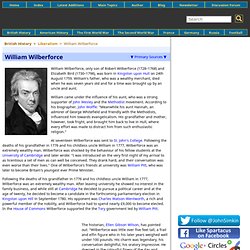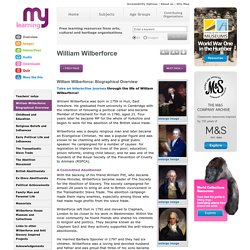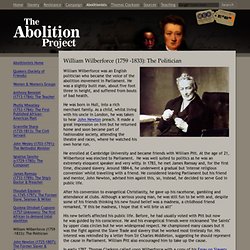

William Wilberforce. William Wilberforce, only son of Robert Wilberforce (1728–1768) and Elizabeth Bird (1730–1798), was born in Kingston upon Hull on 24th August 1759.

William's father, who was a wealthy merchant, died when he was seven years old and for a time was brought up by an uncle and aunt. William came under the influence of his aunt, who was a strong supporter of John Wesley and the Methodist movement. According to his biographer, John Wolffe: "Meanwhile his aunt Hannah, an admirer of George Whitefield and friendly with the Methodists, influenced him towards evangelicalism. His grandfather and mother, however, took fright, and brought him back to live in Hull, where every effort was made to distract him from such enthusiastic religion. " At seventeen Wilberforce was sent to St. The historian, Ellen Gibson Wilson, has pointed out: "Wilberforce was little over five feet tall, a frail and elfin figure who in his later years weighed well under 100 pounds.
Click anywhere on this page to access this site. Click anywhere on this page to access this site. William Wilberforce Biography. "William Wilberforce...was a great man who impacted the Western world as few others have done.

Blessed with brains, charm, influence and initiative, much wealth … he put evangelism on Britain's map as a power for social change, first by overthrowing the slave trade almost single-handed and then by generating a stream of societies for doing good and reducing evil in public life… To forget such men is foolish. " -J.I Packer William Wilberforce (1759-1833), abolitionist and philanthropist, was born to a family of merchants. He was first educated at Hull Grammar School under Joseph Milner, an evangelical Anglican minister. His father died when Wilberforce was nine, and his mother sent him to stay near London where he was reared by an evangelical aunt and uncle. Wilberforce's mother and other close family friends were alarmed at young William's religious "enthusiasm" and sought to reverse this course.
In 1779, Wilberforce moved to London where he became friends with William Pitt. William Wilberforce. William Wilberforce was born in 1759 in Hull, East Yorkshire.

He graduated from university in Cambridge with the intention of following a political career and became Member of Parliament for Hull in 1780, aged 21. Four years later he became MP for the whole of Yorkshire and began to work for the abolition of the British slave trade. Wilberforce was a deeply religious man and later became an Evangelical Christian. He was a popular figure and was known to be charming and witty and a great public speaker. He campaigned for a number of causes: for legislation to improve the lives of the poor; education; prison reforms; ending child labour; and he was one of the founders of the Royal Society of the Prevention of Cruelty to Animals (RSPCA). A Committed Abolitionist With the backing of his friend William Pitt, who became Prime Minister, Wilberforce became leader of The Society for the Abolition of Slavery. He married Barbara Spooner in 1797 and they had six children.
The Slavery Abolition Bill. William Wilberforce (1759 -1833): The Politician: The Abolition of Slavery Project. William Wilberforce was an English politician who became the voice of the abolition movement in Parliament.

He was a slightly built man, about five foot three in height, and suffered from bouts of bad health. He was born in Hull, into a rich merchant family. As a child, whilst living with his uncle in London, he was taken to hear John Newton preach. It made a great impression on him but he returned home and soon became part of fashionable society, attending the theatre and races, where he watched his own horse run.
He enrolled at Cambridge University and became friends with William Pitt. After his conversion to evangelical Christianity, he gave up his racehorse, gambling and attendance at clubs. His new beliefs affected his public life. In early 1787, Thomas Clarkson called upon Wilberforce with a copy of his Essay on Slavery. From 1789, Wilberforce regularly introduced bills in Parliament to ban the Slave Trade.